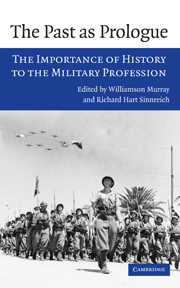Book contents
- Frontmatter
- Contents
- Contributors
- 1 Introduction
- 2 Military history and the history of war
- Part I The influence of history on the military profession
- 3 The relevance of history to the military profession: a British view
- 4 The relevance of history to the military profession: an American Marine's view
- 5 Awkward partners: military history and American military education
- 6 Thoughts on military history and the profession of arms
- Part II The past as illuminator of the future
- Index
3 - The relevance of history to the military profession: a British view
Published online by Cambridge University Press: 05 June 2012
- Frontmatter
- Contents
- Contributors
- 1 Introduction
- 2 Military history and the history of war
- Part I The influence of history on the military profession
- 3 The relevance of history to the military profession: a British view
- 4 The relevance of history to the military profession: an American Marine's view
- 5 Awkward partners: military history and American military education
- 6 Thoughts on military history and the profession of arms
- Part II The past as illuminator of the future
- Index
Summary
Although the extent to which history in general is relevant to the military profession is a matter for debate, I doubt that there is much argument to be had that, in principle, a knowledge and understanding of military history is at least of some relevance and, indeed, use. But to what extent has the British military, in particular the British Army, recognized and exploited this relevance? And if we have a use for military history, do we still have a need for it in the twenty-first century? If so, how much? This chapter sets out to answer these questions from the personal perspective of a British military professional.
The military profession in the United Kingdom has had a highly variable attitude toward military history over the past century or so. Of course, the services have contained many individuals with a love of military history and many who have found in it some utility in their profession. There are those who have studied military history at university, and some who have continued to study it throughout their careers, although it is impossible even to estimate their number. Rather easier to quantify would be the number of those who have made important written contributions to the subject, either when retired or while still serving, but it is striking to note the low proportion in the latter category.
- Type
- Chapter
- Information
- The Past as PrologueThe Importance of History to the Military Profession, pp. 23 - 33Publisher: Cambridge University PressPrint publication year: 2006
- 1
- Cited by



